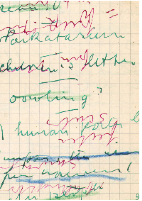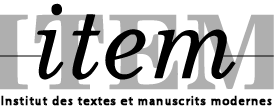
02/02/2009
Genetic Criticism is one of the most interesting ap-proaches to the interpretation of texts and to the recon-struction of creative processes conceived in the last 40 years. “Like old-fashioned philology or textual criti-cism, it examines tangible documents such as writers’ notes, drafts, and proof corrections, but its real object is something much more abstract— not the existing documents but the movement of writing that must be inferred from them. Then, too, it remains concrete, for it never posits an ideal text beyond those documents but rather strives to reconstruct, from all available evi-dence, the chain of events in a writing process” (Daniel Ferrer and Michael Groden). Developed in France at the Institut des Textes et Manuscrits Modernes (ITEM / CNRS-ENS, Paris) this new methodology is now widespread all over the world.
This study day will gather some of the most important ITEM scholars presenting and discussing their editions and interpretations. Day one will start with the analysis of two masterpieces of genetic editions: the Joyce Finnegans Wake notebooks and the Proust notebooks for À la recherche du temps perdu, followed by the project presentation of an electronic edition of Rousseau’s unpublished avant-textes for La Nouvelle Héloïse.
During the afternoon session, the theoretical aspects of the genetic methodology will be addressed. Starting from the original core devoted to the interpretation of literary texts and manuscripts, three recent extensions will be taken in account: the genetic analysis of scien-tists’ manuscripts and laboratory notebooks; the appli-cation of genetic enquiry to drama (scripts, scenarios, rehearsal notes…) and to musical manuscripts; and finally the study of genetic processes in the visual arts and in the cinema will disclose future perspectives and research domains.
Day two is conceived as a hands-on workshop where a small group of interested students or researchers will have the occasion to participate to a live session of manuscripts transcriptions and genetic interpretation under the guidance of the ITEM experts and with cop-ies of the original documents.
All those interested are welcome to attend day one.
For participation on day two a simple registration is required (please email maison@herald.ox.ac.uk).
—
Programme
—
MONDAY, 2 FEBRUARY 2009
Editions
Chair: Paolo D’Iorio
9.30Coffee
10.00Daniel Ferrer, James Joyce: The Finnegans Wake Notebooks at Buffalo
10.40Nathalie Mauriac-Dyer, Marcel Proust: Note-books 1 to 75 of the Bibliothèque nationale de France
11.20Coffee
Chair: Nathalie Mauriac-Dyer
11.35Nathalie Ferrand, An insight into Rousseau’s writing process for La Nouvelle Héloïse: col-lecting, editing online and interpreting Jean-Jacques Rousseau’s manuscripts
12.00Paolo D’Iorio, Towards an electronic genetic edition
Methods
Chair: Luc Borot
14.30Daniel Ferrer, The Principles of Genetic Criticism
15.10Muriel Le Roux, Scientists’ Notebooks
15.50Almuth Grésillon, Critique génétique et arts de la performance: théâtre et musique (abstract in English provided)
16.30Tea
17.00Pierre-Marc De Biasi, Genèses des formes, genèses filmiques: Nouvelles frontières de la critique génétique (abstract in English provided)
TUESDAY, 3 FEBRUARY 2009
Practices
9.30 Coffee
10-13 Hands-on workshop on manuscripts of Joyce, Proust, Flaubert, English and French Scientists.

















